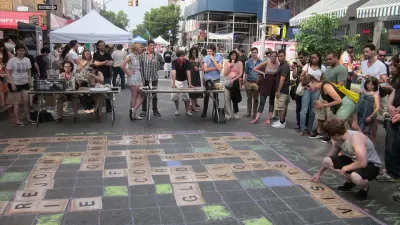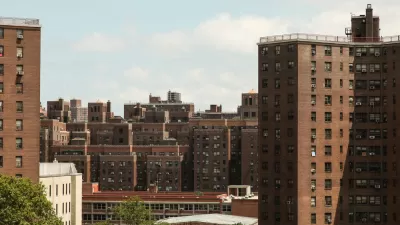Urbanists and their ilk might have been disappointed in the first presidential debate's lack of focused attention to affordable housing, infrastructure, and other issues of importance to cities.

Daniel McGraw provides a critique of the first debate between Hillary Clinton and Donald Trump, focusing on the "several exchanges that might resonate with Americans who spend their days thinking about and working on challenges facing U.S. cities."
McGraw starts with the moment that Clinton "accused Trump of cheering for the housing market collapse 10 years ago," too which Trump replied, in his own words, "That's called business."
According to McGraw's evaluation, "the fact that a presidential candidate sees housing as little more than a commodity without any other economic or cultural implications is very telling in many ways." The fact that many American's probably agree with Trump on this point, according to McGraw, is "why this race has been so hard to figure out."
Among the other subjects that were briefly considered, but without much detail, McGraw lists infrastructure (with Clinton mentioning clean energy and Trump discussing the shortcomings of La Guardia airport). Beyond that, the candidates discussed inequality and racism, but from the frame of policing practices, not affordable housing, environmental justice, or public health. While Clinton suggested criminal justice reform and asked Americans to consider their biases, Trump touted "law and order" and stop-and-frisk.
FULL STORY: Trump and Clinton Debate Over Housing Is Critical to U.S. Cities

Planetizen Federal Action Tracker
A weekly monitor of how Trump’s orders and actions are impacting planners and planning in America.

Maui's Vacation Rental Debate Turns Ugly
Verbal attacks, misinformation campaigns and fistfights plague a high-stakes debate to convert thousands of vacation rentals into long-term housing.

San Francisco Suspends Traffic Calming Amidst Record Deaths
Citing “a challenging fiscal landscape,” the city will cease the program on the heels of 42 traffic deaths, including 24 pedestrians.

Amtrak Rolls Out New Orleans to Alabama “Mardi Gras” Train
The new service will operate morning and evening departures between Mobile and New Orleans.

The Subversive Car-Free Guide to Trump's Great American Road Trip
Car-free ways to access Chicagoland’s best tourist attractions.

San Antonio and Austin are Fusing Into one Massive Megaregion
The region spanning the two central Texas cities is growing fast, posing challenges for local infrastructure and water supplies.
Urban Design for Planners 1: Software Tools
This six-course series explores essential urban design concepts using open source software and equips planners with the tools they need to participate fully in the urban design process.
Planning for Universal Design
Learn the tools for implementing Universal Design in planning regulations.
Heyer Gruel & Associates PA
JM Goldson LLC
Custer County Colorado
City of Camden Redevelopment Agency
City of Astoria
Transportation Research & Education Center (TREC) at Portland State University
Jefferson Parish Government
Camden Redevelopment Agency
City of Claremont





























